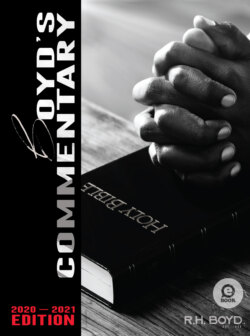Читать книгу Boyd's Commentary - R.H. Boyd Publishing Corporation - Страница 74
На сайте Литреса книга снята с продажи.
III. IT’S ALL ABOUT LOVE (1 CORINTHIANS 13:8–13)
ОглавлениеPressing his argument of what love is, Paul described three other spiritual gifts as being temporary when compared with love. Prophecies, tongues, or divine knowledge all will pass away long before love does because love is eternal and never fails. As Paul talked about the perfect nature of love in verse 9, he was referencing the moment in which love matures in us. When that time comes, dependency on spiritual gifts will not be as necessary as it once was.
Paul supported his view with two analogies. First, he appealed to a parallel of the natural experience of maturation, explaining that when he was a child, he spoke, understood, and thought as a child. When he became a man or matured in love, he put away childish things. Because they are limited by the constraints of this life, the gifts of prophecy, tongues, and knowledge, when compared to love, were considered by Paul to be childish things. As a subtle rebuke to the Christians in Corinth, Paul was saying that fighting over spiritual gifts is childish and something one outgrows when they have matured in love.
Each one of the listed gifts only appears in part. Though this appears to be obvious, it is important to note for it is not uncommon for gifted people to behave as if their gifts are final and complete. Paul was simply arguing that as good as a prophecy or knowledge might be, neither represents the fullness of God or His vision for the world and His people. An example is the prophecies of the Old Testament that represented the coming of the Messiah. Each one held merit in itself. However, none of them represented the fullness of the Christ in the person of Jesus. Jesus was the end of those prophecies, but each only provided a snippet of the totality of His character, beauty, grandeur, and wisdom. Love, however is the fullness of the deity, for God is love and love is from God (1 John 4:7–8).
Paul’s second analogy involved the experience of looking dimly in a mirror. In Paul’s day, Corinth was well-known for its mirrors. Because their mirrors were made of polished brass, some interpreters have argued Paul referred to the fact that metal mirrors reflected one’s image only imperfectly. Corinth, however, made high-quality mirrors that probably provided good reflections. Yet even the reflection of those mirrors was no substitute for a real person. A modern parallel would be a photograph. Modern believers enjoy clear photographs of loved ones, but those pictures barely begin to portray the wonderful people they depict. For Paul, the gifts of the Spirit are like photographs for the community for now. When love is made complete in us, everyone will experience the God in the photographs from a more intimate face-to-face disposition. At this point a full knowledge can be recognized. Only through experiencing the being and isness of God is this made complete. This is differentiated from a simple viewing, as in a mirror or a picture. It’s being in the presence of and seeing, feeling, touching. Quite simply, experiencing something is quite different than observing something.
Paul closed his discussion of the most excellent way with a summary of what should be most important for the believer—faith, hope, and love. These three remain when all else is gone. The language used here was intentional as Paul argued that all other gifts will pass away. Faith, hope, and love will stand the test of time, trial, and—given Paul’s predilection to eschatological thought—even the parousia (the second coming). These virtues will survive and be necessary even as the world fades away. Thus they each stand above all other spiritual gifts, displacing the Corinthians’ favorites, such as prophecy, tongues, and knowledge. Love is raised even higher. Out of the three, it is the greatest. Love completes all other gifts and is what has been demonstrated by God and through God.
